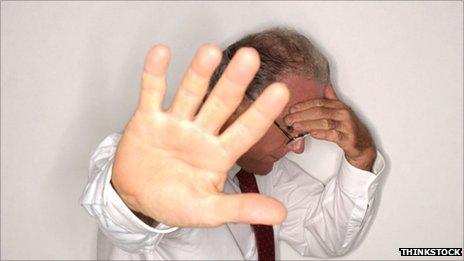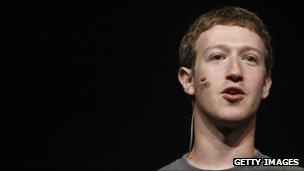Viewpoint: Should we do away with privacy?
- Published
- comments

As battle rages over how Facebook and others impact on our privacy, Cindy Gallop has a radical idea. Forget about privacy and control your image instead.
The new reality that all of us live in today, personally and professionally, is one of complete transparency.
Everything we do and say today, whether we are a person or a brand, business or company, is potentially in the public domain courtesy of the internet.
If you find that prospect deeply unnerving, there is a very simple solution, and interestingly, that solution is the same whether you are a person or a company.
If you identify exactly who you are and what you stand for, what you believe in, what you value, and if you then only ever behave, act and communicate in a way that is true to you, then you never have to worry about where anybody comes across you or what you're found doing.
By definition you are never caught doing anything to be ashamed of.
So, at a time when there are many debates about the privacy settings on Facebook and the ethics of Wikileaks, I actually come from the complete opposite end of that argument. I believe in living your life and operating your business in a way that means you never have to worry about any of that.
Have you registered your ownname.com? The first thing that anybody does today when they meet you is they Google you, and when that happens you want to ensure three things - that you have a very strong online personal digital brand presence, that you Google in the right kind of way, and that you do not Google in the wrong kind of way.
Those three things are, predominantly, very much within your control. Ideally when someone Googles your name, you want to turn up as result number one on page one and you want to use that presence, your personal website, your personal blog, to tell people how to think about you before Google does it for you.
Now obviously that forces the question, so what do I want people to think about me, how do I want to manage people's perceptions of me? Well, a good way to think about that is to identify what is your personal default throwaway descriptor.
Imagine two people are talking. One of them knows you and one does not.
The person who knows you makes some reference to you and the other person says, "Oh, who's that?", and the person who knows you says, "You know, they are X". That X is your default throwaway descriptor, and it is in your interests to make sure that it is something you would like it to be, because that is what people will default to in their description of you.
Exactly the same thing operates for a company or a business, too. You need to identify exactly what it is that you do as a business and you need to capture it and encapsulate it in a quick, easy and memorable soundbite, because you rely on people to spread the word of what your business does in order to get more business.
The aspect of this that a lot of people find quite difficult is that it forces you to ask yourself the question: "Who am I?" That is something that none of us really spends a great deal of time thinking about, and all too often throughout the course of our life and business, we allow other people and other things and other circumstances to define that for us.
I have a start-up and when we were first starting the website, my tech team brought me the homepage design and my programmer said to me: "Look, Cindy, we've designed this exactly the way you wanted us to, we've got 'If I Ran the World', and because we think people will be quite fazed when they arrive at the homepage, we've put a button in the box so they know there's somewhere to go."
And I said: "No, take the button out, I want people to be faced with an empty box because I want that to force a few moments of what very rarely happens in our life today, which is self-reflection."

If you don't want your boss to see drunk pictures of you, take action
All over the net today, if you post a profile, you can post a photograph of you at your most attractive, you can post a carefully crafted mosaic of the books and music you like that gives a certain impression, you can lie.
On my website you can't lie about anything because, apart from some basic information about yourself that you enter upfront, your profile is automatically generated by your actions. So when you look at it, it is you at a glance.
You are self-identifying and self-expressing in a very particular way which is: "I am what I do, I am the sum of my actions."
That adds up to an overall benefit which I call action branding. Personal action branding is for individuals and corporate action branding is for brands and businesses, and it is the advertising of the future.
Coming from the ad industry, I believe the advertising of the future is not about saying, it is about doing. It is not about telling, it is about being. Brands will be judged just as people are so action branding is communication through demonstration.
So when I launched my own company, I designed it to be transparent, because three years ago when I came up with the concept, people said to me: "Oh my God, Cindy, you're going to start a business that is all about doing good and you are going to make money out of it? Eek! People will not buy that, you have got to be a non-profit."

Some people think this man is not in love with the concept of privacy
The way I respond to that criticism was to say: "OK, I'm going to make my business model completely transparent." Whenever anybody asks how do you make money, I can just tell them.
Now in a world of transparency, I am essentially unblackmail-able. I'm unblackmail-able because I have a secondary venture called Make Love Not Porn, and I launched it at the TED conference [organisation that promotes ideas] in 2009.
Once you have stood up on the stage at TED and announced that you have sex with younger men, no-one can ever shame or embarrass you ever again. So I live my life completely in the open, and that is an enormously stress free and relaxing way to be.
And by the way I realise that I am quite an extreme example of this, but the principles are the same for everybody.
So I would exhort you to think about who you are, and think about how you can redesign your life and your work to mean that you are always true to yourself, and you never have to worry about what anyone might find about you or where anybody sees you or what anybody finds when they Google you.
This is an edited version of Cindy Gallop's Four Thought broadcast.